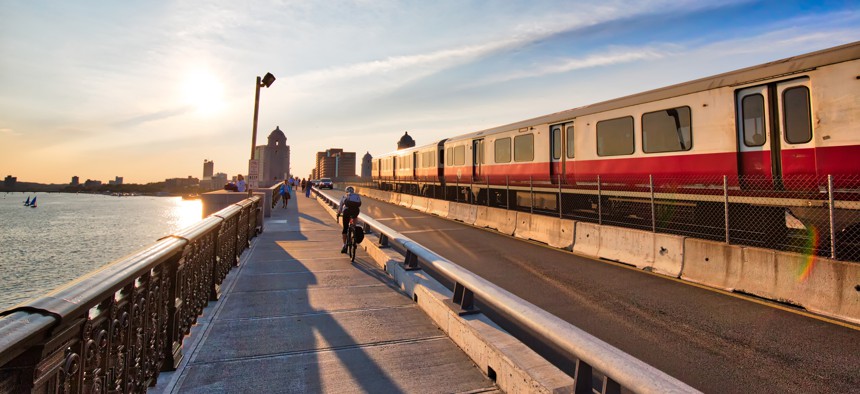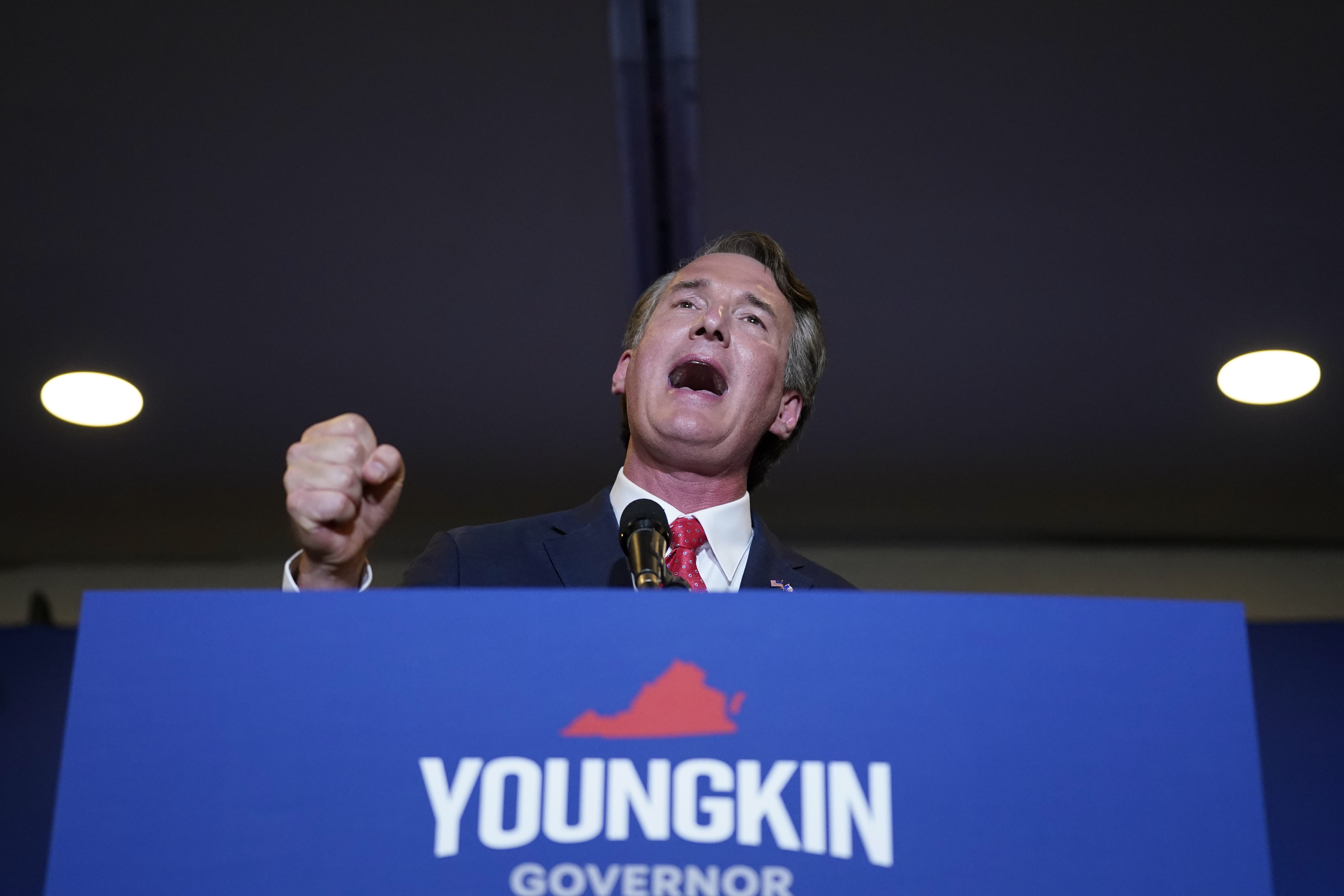Introducing Route Fifty's Infrastructure Update

A Massachusetts Bay Transportation Authority train crosses a bridge over the Charles River in Boston. iStock.com/Elijah-Lovkoff

Connecting state and local government leaders
In this first edition of our new weekly newsletter, we look at the implications of the November election results on infrastructure issues around the U.S.
This is an archived version of Route Fifty's weekly Infrastructure Update newsletter. Subscribe here to receive the newsletter by email.
****
Hello and welcome to the first edition of Route Fifty's Infrastructure Update. I'm Dan Vock, a D.C.-based reporter who has covered the state and local side of infrastructure for a decade. Congress's passage of a $1.2 trillion infrastructure bill last week marked a pivotal moment for investment in U.S. public works, and promises to funnel hundreds of billions in new federal dollars towards roads, transit, waterworks, broadband and other types of projects in the years ahead. Over the coming weeks in this newsletter, we'll take a closer look at some of the programs in that bill, and also across the country to action unfolding at the state and local level with infrastructure funding and projects. A quick programming note: We're planning to run this newsletter for about two months and it will go out on Tuesday afternoons.
And with that, let's talk infrastructure!
Election Fallout and, Finally, an Infrastructure Bill
Last week's elections, particularly Republican Glenn Youngkin's victory in Virginia, have Democrats around the country rethinking their political priorities. But a disappointing Election Day for the Dems also likely helped to finally shake loose the $1.2 trillion infrastructure package that had been stalled in the U.S. House for months. Democrats and a handful of Republicans approved the bill Friday, sending it to President Biden's desk. As Route Fifty reported over the weekend, this is a milestone for state and local governments, who have pressed for years for greater federal investment in public works.
The elections had implications for infrastructure issues closer to home too. Voters in some areas elected leaders with new transportation priorities, while infrastructure ballot measures around the country drew strong support paving the way for road repairs and other upgrades. Electorates in 17 states decided initiatives that affected transportation funding, according to the American Road and Transportation Builders Association. Most were local measures—225 in all—and 89% of them passed. That's in line with past results. About 84% of state and local transportation funding measures have won voter approval since 2010, supplying an estimated $326 billion in new and renewed revenue, ARTBA notes.
Looking around the country, here are some of the notable infrastructure storylines to keep an eye on as political power changes hands...
Will Virginia's Rail Plan Remain on Track?
With Youngkin's election, new questions hang over an ambitious passenger rail expansion plan. Under Gov. Ralph Northam, a Democrat, Virginia signed onto a $3.7 billion passenger rail improvement project. The state finalized a deal with Amtrak and freight railroads in March to expand service between Washington, D.C., and Richmond. That will involve building a new rail bridge across the Potomac River and additional tracks along existing corridors to reduce bottlenecks.
Transportation didn't play a major role in the race between Youngkin and former Virginia Gov. Terry McAuliffe—it was overshadowed by other issues, like education and the state's Covid response. But the changeover in the governor's office could mean the passenger rail plans get another look.

Yonah Freemark, a transportation and land use expert for the Urban Institute, noted that Democrats in Virginia, over the past few decades, have devoted considerable attention to improving intercity rail. "This election frankly puts that in peril, if only because the main issues we've heard from the [newly elected] governor are about roadway expansion," he added.
Youngkin has also criticized gas tax hikes that have helped pay for a variety of infrastructure improvements in the state.
But Danny Plaugher, the executive director of the Virginians for High-Speed Rail, said many of the passenger rail improvements Northam has touted are "already baked in." Unlike other states, Plaugher noted, Virginia automatically sets aside 7% of its transportation spending for passenger rail. And historically, he added, Republican governors in Virginia have backed commuter rail and Amtrak expansions. (Maybe because, regardless of political party, many Virginians know the pain of sitting stuck in traffic on the often-jammed I-95 corridor.)
Also notable here: The infrastructure bill just passed by Congress includes billions of dollars more to support intercity passenger rail like Amtrak. Plaugher said he doubted that Youngkin would turn down that money, the way that former Wisconsin Gov. Scott Walker and other Republicans pulled the plug on Obama-era rail projects.
Can New Boston Mayor End Transit Fares?
In Boston, newly elected mayor Michelle Wu has promised to end fares for the "T," the region's bus and rail network. Wu, who takes office next week, has offered few details about that plan. It's unclear, for example, if she wants fare-free service just for buses or for subways and commuter rail, too. And because the regional transit agency in the Boston area is actually state-run, Wu will need buy-in from the governor or legislature to enact her boldest ideas.
Ben Fried, the communications director for TransitCenter, a national advocacy group, said he expects Wu to have a firm grasp on the issues transit riders face. "Michelle Wu was an early adopter of pro transit policies in Boston," Fried said, noting that she was one of the first city council members to support bus lane projects. "She is a habitual transit rider. She took her kids on the bus. This was her primary way of getting around. She has more insight into what transit riders need and what makes good transit than almost any other mayor of a big city."

Fare-free transit is an idea that has gained traction in recent years in other places around the U.S., with a number of cities exploring or adopting the concept. For instance, Kansas City, Missouri has implemented a zero-fare transit program, and the transit agency that provides bus service in Olympia, Washington has a five-year fare-free demonstration project underway.
Will the Big Apple Get More Bus and Bike Lanes?
In New York City, Mayor-elect Eric Adams will face a quick test when he takes office Jan. 1 of how dedicated he is to the vision of expanded bike and bus lanes that he shared on the campaign trail, Fried said. Mayor Bill de Blasio has rolled out many miles of bike and bus lanes. But he put off a decision about whether to install a bus-only lane on one of the city's most famous streets—Fifth Avenue. The dedicated lane would help bring blue-collar workers from the outer boroughs into midtown Manhattan, Fried explained, but high-end retailers and real estate magnates with buildings on that stretch have resisted. That project is slated to go forward next year, so Adams will have to decide fairly quickly whether he's on board with it.
As Brooklyn borough president, Adams impressed some advocates with his support for active modes of transportation. He made a show of riding his bike to press conferences, and has promised to install 300 miles of protected bike lanes once he takes office. He has also backed a proposal to convert 25% of all the city's street space to non-auto uses. Rethinking how much space is devoted to cars is something that came up in cities throughout the pandemic, with some places closing streets to vehicles to give people more space.
New York's transportation problems are legion, however, and critics say previous administrations have started a lot of ambitious proposals without seeing them through. Even the many new bike lanes and bus lanes sometimes have limited use, because they don't connect together well and they're frequently blocked by double-parked vehicles.
"Frankly, we've seen in the past a number of people run for mayor in New York City and not fulfill their platforms in terms of their commitment to building transit and bike lanes," the Urban Institute's Freemark said. "So I think we should always be skeptical."
That's it for this edition. If you haven't already, consider signing up here for Route Fifty Today, our daily newsletter, where you can stay up to date on the latest trends and best practices happening in state and local government nationwide. If you have news tips or feedback, if you want to share your community's story, or if you just want to say hello, please email us at: editor@routefifty.com. Thanks for reading!

NEXT STORY: $1.2T Infrastructure Plan Offers Lucrative Target for Fraud



